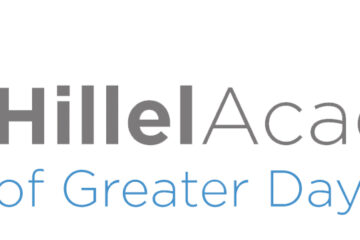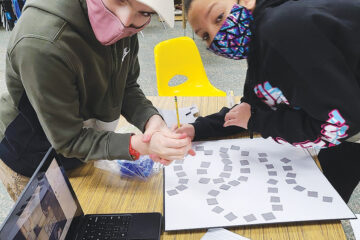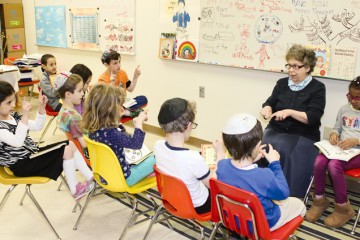Hillel day school students learn across curriculum with microgreens
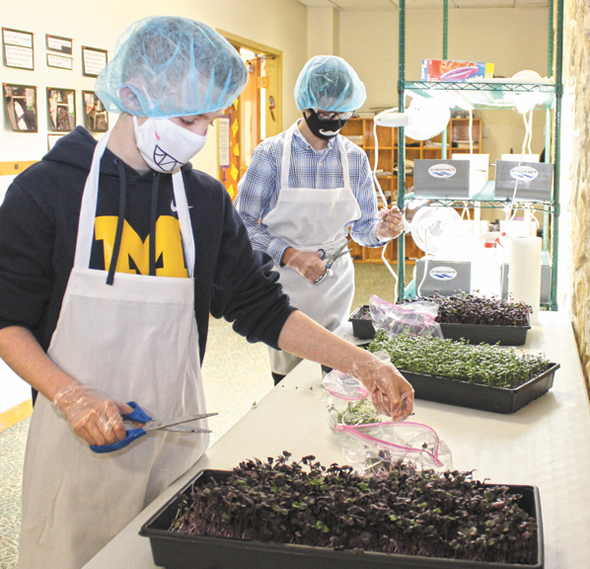
By Marshall Weiss, The Dayton Jewish Observer
Hillel Academy Jewish day school, which champions a project-based approach to learning, has made indoor farmers of its fifth- and sixth-grade students.
With help from a registered dietitian nutritionist — and now from a hydroponic farming educational initiative in Israel — Hillel students began growing and harvesting microgreen crops in January.
Microgreens are edible herb and vegetable seedlings. According to a study at the University of Maryland published in the Journal of Agricultural and Food Chemistry, microgreens have up to 40 times more vital nutrients than mature plants.
“It’s crazy how this tiny little plant has so many nutrients,” says fifth grader Avi Gilbert as he harvests a crop of radish microgreens. “It’s really cool how we actually have a farm inside. There are a bunch of variables that are different from when it is outside.”
Dietitian and nutritionist Shari Jacobs, a parent of Hillel alumni, approached Hillel Curriculum/Instruction Director Dr. Kathy Mecoli with the idea for the farm because of Jacobs’ passion for promoting nutrition, pesticide-free growing, and eco-friendly agriculture, which reduces water use in farming.
“They’re learning science, they’re learning food safety, and nutrition,” Jacobs says.
With funding from Hillel families and alumni, a local farmer installed the school’s microgreen system and showed faculty and students how to get started.
Among their crops are arugula, kale, parsley, radish, mustard, and broccoli.
Through meticulous data collection, the students learn how to maximize their crop yields. And they’re figuring out how to learn from their mistakes.
Fifth grader Logan MacDonald recorded in his microgreens blog, “Some of the microgreens they have been growing recently started dying. The class brainstormed and realized the problem probably was because of saturation, microfiber wicks being cut into thirds, depth in the soil or the soil was too deep. The intermediate class decided to establish a clear step process of jobs to increase the likelihood of less plant death. The class decided to cut the microfiber wicks into halves instead of thirds to stop the problem.”
Mecoli says the school’s approach is to model how to learn.
“What we find is that because they’ve become such good thinkers, they can pretty much solve the problems once you set them in a certain direction,” she says.
“They’re going to be blogging a lot,” says Todd Brisco, Hillel’s instructor of integrated project-based learning. “They’re putting data on spreadsheets to see whether we’re keeping them in the blackout (germinating) period long enough. We don’t know: how long should we let them grow before we harvest, because we made a mistake of harvesting too soon.”
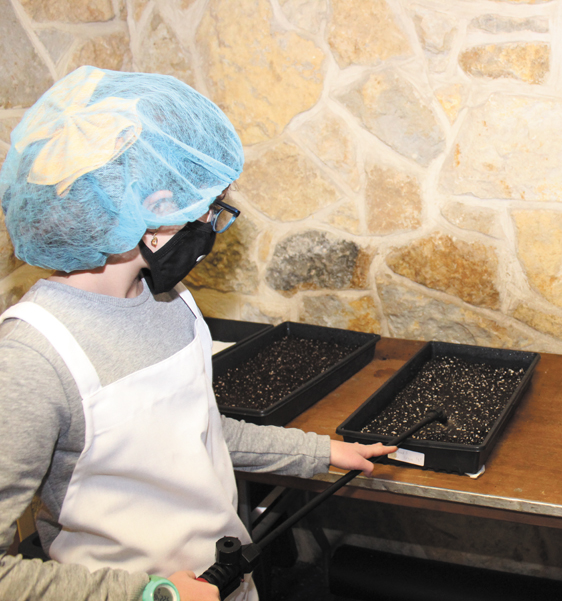
Once the students get the system down, Mecoli says, they’ll train the fourth graders, who will carry the project forward next year.
Now, Hillel’s fifth and sixth graders are sharing their data with students working on the same project in Jerusalem. Hillel is the first school affiliated with Israel’s Start Up Roots program outside of the Jewish state.
Robin Katz founded the non-profit Start Up Roots four years ago to bring hydroponic farming to a school for girls from impoverished Haredi families in Jerusalem. The girls also learn how to market their products to the student body.
“In one cycle,” Katz says, “It changed the handout mentality they had, to their hands out with something to give — so proud and excited.”
Katz adds that the school also hired a chef who taught the students what they could do with the vegetables, from drinks to appetizers to desserts.
“They started with a summer camp and then they ended up revamping the whole school lunch program,” Katz says.
In Israel, Start Up Roots is taught in three middle schools, about to enter a fourth, and recently received approval from Israel’s Ministry of Education, which will help it expand.
“Entrepreneurship, life skills, and nutrition: those aren’t taught in schools and that’s such a growing problem,” she says.
Katz reached out to Jacobs when Start Up Roots began to add microgreens at a school.
“We’re learning a lot from Shari,” Katz says. “She’s implementing in a very methodical way that will enable us to really understand how to improve it, how to replicate it, expand it in the most efficient way possible.”
Jacobs is now Start Up Roots’ American educational liaison; she and Katz aim to bring the program to other schools in America.
Hillel is connected to the Shaarei Tziyon school in the Neve Yaakov settlement neighborhood of Jerusalem.
“We’ve been emailing them about things we’re doing for the microgreens, our problems,” says Hillel fifth grader Yiyi Li Kudera.
The Hillel students email their Israeli counterparts in Hebrew, guided by Hillel’s Hebrew instructor, Rina Thau.
“Now there’s a back and forth,” Katz says. “And the kids hope that they’ll meet one day.”
Katz and Jacobs have also developed a Start Up Roots microgreen curriculum that melds science and Jewish values related to food justice, such as why there are blessings over food and the obligation to those in need.
“We did a project on world issues,” says DeLaine Niesley, who teaches Hillel’s fifth and sixth graders reading and writing. “We’re finding out conditions that cause poverty, including what’s here in Dayton. Because there’s this assumption that we’re America: we don’t have that here.”
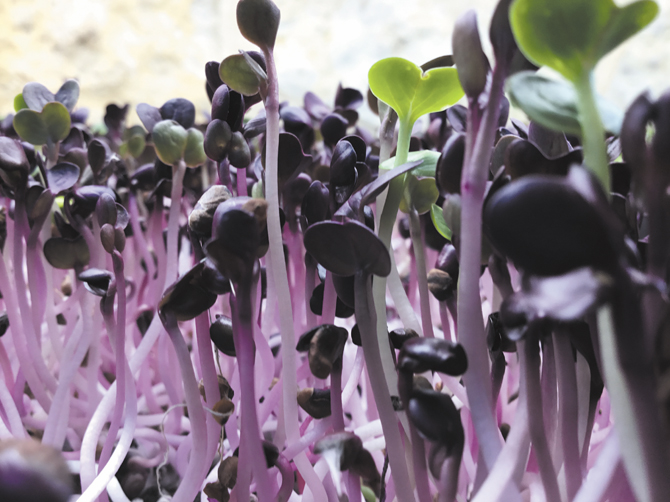
“There are so many parts to it,” Mecoli says of the program. “Each day at lunch, the children put out microgreens on a tray and they go around and give everybody microgreens if they want them with their lunch.
“The little kids see it as cool because the older kids are doing this. I don’t even say anymore, ‘Go get the microgreens.’ They come to me and say, ‘Can we get the microgreens?’ So there’s a lot of independence and a lot of ownership with it.”
Once the students have mastered the science of growing their microgreen crops most efficiently and effectively, Hillel plans to bring its produce to market.
Mecoli says they’ll learn the cost to produce them, the profit, and entrepreneurship.
“Bernstein’s Fine Catering, they are committed to buying them from us to use as garnishes,” Mecoli says. “We’ll engage markets that could buy some from us every week.”
For now, they’re starting small. At Purim, the school was sending shalach manot gift packages to its Life & Legacy donors.
“We’re coming up with a little tower with three boxes of one-ounce of microgreens, and then we’re going to have crackers and hummus in one, and (parent) Rochel Simon is going to bake hamantashen that are more savory, with the microgreens in them, and then we’ve created a little card that says thank you for supporting Hillel,” Mecoli says.
For Passover, the school hopes to have parsley available for order.
To read the complete April 2019 Dayton Jewish Observer, click here.


